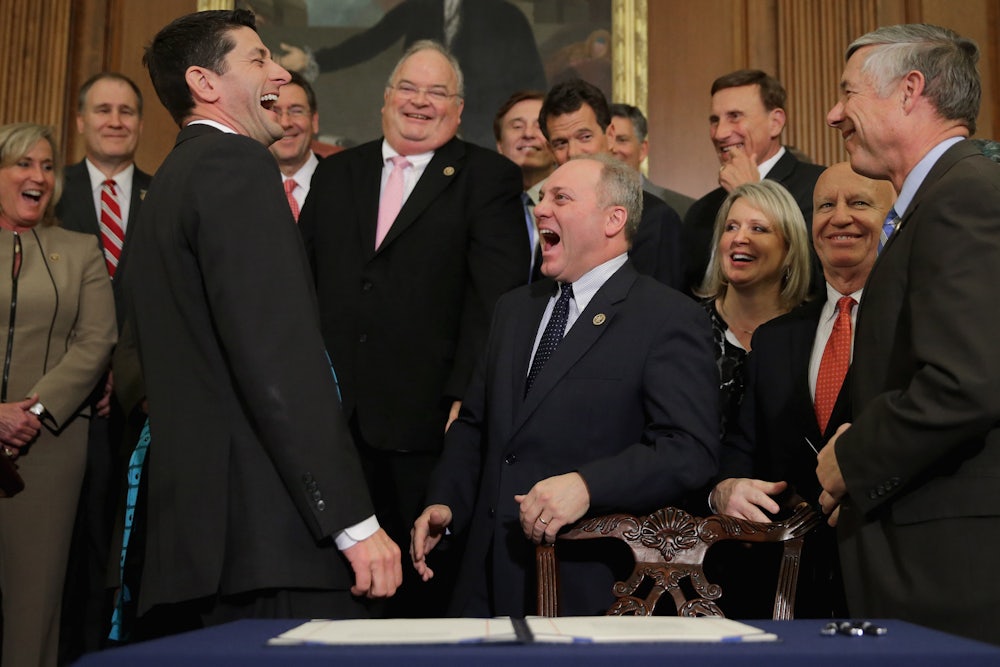Over the course of Barack Obama’s presidency, House Republicans voted to partially or entirely repeal the Affordable Care Act so many times that watchers lost count at around 60. But it seems the GOP didn’t truly believe it could win the White House in 2016, because they never coalesced around a non-symbolic plan to repeal Obamacare and what, if anything, to replace it with.
Republicans on Capitol Hill today are thus mired in dysfunction. The main impediment to repealing Obamacare is a substantial bloc of GOP lawmakers who won’t vote to repeal the law without a replacement in hand, and the main impediment to replacing Obamacare is a lack of consensus among Republicans about what they should enact in its place.
That consensus eluded Republicans for the entire Obama presidency—long enough to suspect it isn’t going to arise now, magically, in the brief window Republicans have to make good on years’ worth of promises that seem more impossible each day. President Donald Trump invited derision on Monday when he said, “nobody knew health care could be so complicated,” yet he was merely revealing he had been taken in by those very promises.
But the drive to repeal Obamacare has its own momentum. Republicans have staked so much of their credibility on the repeal pledge that they can’t easily walk away from it. Even if President Donald Trump and GOP leaders recognized that they were marching their party into a trap, they are gripped by a collective action problem, wherein nobody wants to be held accountable for failure or surrender.
This has left repeal supporters grasping for tactical maneuvers that might salvage the repeal-and-replace strategy. They’re coalescing around a carrot-and-stick approach that combines a morally obscene sales pitch and an aggressive squeeze play, meant to cow squeamish Republicans and far-right hardliners into submission before the window closes.
The Republican health policy divide falls along the same line of ideological stridency that made the party ungovernable during the Obama years. Though many Republicans are indifferent to health care as a policy issue, there are some who don’t want to upend the ACA in a way that leaves millions of people worse off, and others who believe the federal government’s role in financing and regulating health insurance needs to be scaled back radically. Moderates, the politically vulnerable, and those whose constituents have taken disproportionate advantage of Obamacare are reluctant to overhaul the law; members of the House Freedom Caucus and other radicals will not support an ACA replacement that doesn’t dramatically reduce the general welfare.
RSC chair Mark Walker on Repub plan to replace Obamacare: "In that form and absent substantial changes, I cannot vote for the bill..."
— Billy House (@HouseInSession) February 27, 2017
The views of these two camps are irreconcilable unless the moderates become convinced a Paul Ryan–approved ACA alternative isn’t as draconian as it almost certainly will be; and unless the radicals can be convinced the same plan is a take-it-or-leave-it opportunity to get the revenge they’ve been seeking for the partisan passage of Obamacare all along.
To accomplish the first part, ACA opponents are reviving the bottom-feeding argument that throwing millions of people off their insurance won’t be a humanitarian disaster because insurance is worthless.
“What do we want out of the health care system? We want healthier outcomes,” Kentucky’s GOP governor, Matt Bevin, told reporters recently. “That should be the ultimate goal. Simply enrolling people serves absolutely no value if all we’ve given them is a plastic card that says you’re now covered. They take that to a doctor who won’t see them.” White House Press Secretary Sean Spicer has taken to telling reporters Obamacare has made health care access worse.
Their allies in the think tank world will go to elaborate lengths to convince Republicans that “the ACA’s coverage turns out to be ineffective.”
This is somewhat less reckless and offensive than intermittent conservative efforts to discourage potential beneficiaries from signing up for marketplace plans at all—but only because it works indirectly toward the same end of making more people vulnerable to the risks of being uninsured.
Basic common sense exposes the emptiness of these kinds of arguments. ACA opponents will cavalierly discourage strangers from enrolling, or convince people (including lawmakers) that government-financed insurance isn’t effective, but they never seem to go uninsured themselves, or to push friends and families to forego coverage. Nearly all members of Congress and their aides are ACA beneficiaries because the law prohibits them from accessing the system that covers most federal employees. If Republicans in Congress believed Obamacare plans didn’t do any good, more of them would take a pass. If they believed federal health benefits were useless, their repeal bill would exclude them from the Federal Employees Health Benefit Plan in perpetuity.
The purpose of the argument that Obamacare is useless isn’t to convince GOP elected officials to go without insurance, but to give them cover from criticism when they vote for an ACA repeal and the ranks of the uninsured soar.
To the extent Republicans remain unconvinced, party leaders will reportedly try to bully them into submission—perhaps as early as this week—by advancing legislation and daring their own members (the moderates and the hardliners) to take responsibility for killing it in full view of well-heeled pressure groups.
The good news is Republicans have a recent track record of advancing bills without whipping them first, and it is famously poor. But the ACA has unique salience among Republicans, and their failure now wouldn’t doom some symbolic measure or opening bid, but the entire, undying dream of wiping Obamacare off the books.
Republicans tended toward disarray when the stakes were low. The worry for Obamacare’s supporters is that this tendency will disappear rather than worsen now that the stakes couldn’t be higher.
